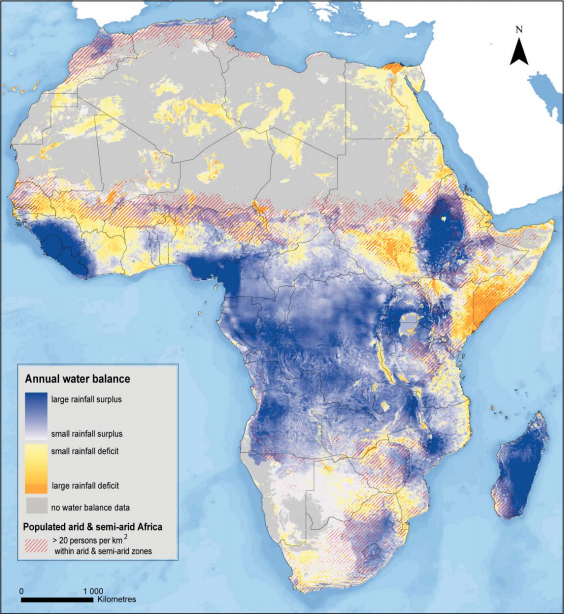Introduction to Water and Politics in Africa
Welcome to my blog Hydro-Power:
Water and Politics in Africa. It is here that I hope to discuss some
of the challenges facing the provisioning of water in Africa, particularly
given the complexity and diversity of this large continent, not just
environmentally but also politically. I come from a background in urban
planning which explores a wide range issues that urban and rural settings may
face in which we try to develop ways to overcome these issues, usually through
policy implementation. A topic within urban planning that is often at the
forefront of debates is infrastructure provisioning, reflecting some of the
topics discussed in this module.
Water is essential for life,
not just for direct consumption, but also for growing the food we eat and for various
economic activities as with any society. It’s also a natural resource with
extreme variance in availability depending on the area. Figure 1 shows the amount
of potentially available water that can be used for harvesting. In addition to
this, water sources are susceptible to contamination if not cared for
appropriately which can lead to major health issues within communities. It’s
these factors among others that make water such a valuable resource and warrants
effective management to ensure everyone has equitable access to water for generations
to come.
Figure
1 – Annual water balance of Africa which means the available harvestable water from
runoff after evapotranspiration.
UNEP
(2012)
Inevitably, this is easier
said than done. As with any valuable resource, managing it effectively and in a
lot of cases, equitably, can be extremely difficult and is vulnerable to becoming
wrapped up in political agendas and tactics. It also raises questions regarding
who should be providing the water in the first place. Is it the obligation of
government to provide these basic needs? In which case, is it acceptable to commodify
a resource of this nature given its necessity for human survival? That being
said, not all the water we consume goes to sustaining our existence, such as
filling up a swimming pool or washing a car.
Throughout this blog I hope
to draw from a number case studies in order to explore these concerns further. Specifically
the relationship between the public and private sectors when managing such a resource,
and how the political realities may have either aided or impeded this process.
Reference List:
UNEP (2012) Africa Water
Atlas (Executive Summary)

Nice Introduction! you have provided us with insight into why you are focusing on water and politics, as well as outlining the direction your blog is heading in. Equality of access to water is indeed a important challenge to address and brings to mind numerous questions such as how do political powers within African countries and communities impact equal access to water? how do we account for water quality and the purpose for using the water when considering equal access to water , can a threshold be used to access the minimum amount of water everyone should have (e.g the WSI (Water Scarcity Index) water scarcity threshold) or should everyone have equal access etc. etc. I am looking forward to reading your future blog posts!
ReplyDeleteThank you Marie, I appreciate your comment.
Delete